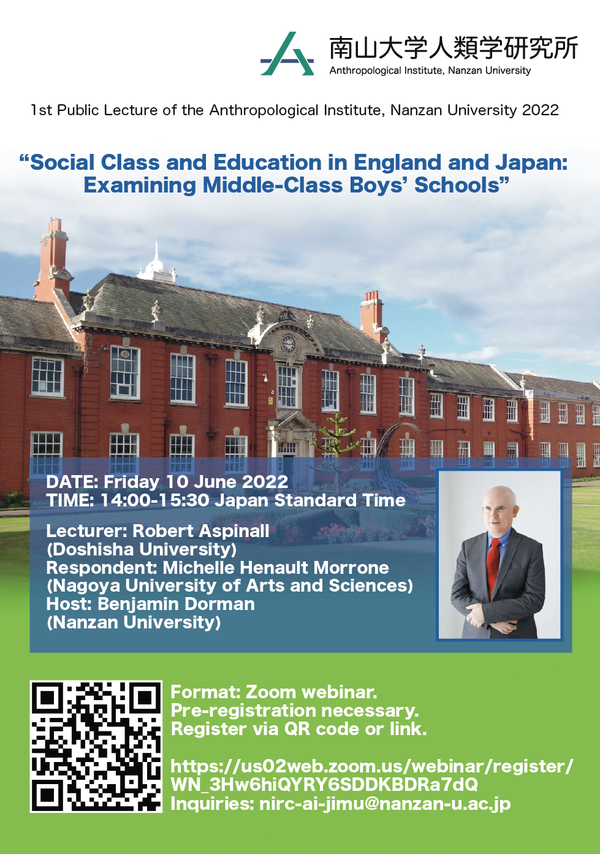研究活動 2021-2025年度
第1回公開講演会 "Social Class and Education in England and Japan: Examining Middle-Class Boys' Schools"
2022年06月10日
2022年度 第1回公開講演会 "Social Class and Education in England and Japan: Examining Middle-Class Boys' Schools"
日 時:2022年6月10日(金)14:00~15:30(発表40分、コメント20分、質疑応答25分)
会場:Zoom Webinar
主 催:南山大学人類学研究所
講 師:Robert Aspinall氏 (同志社大学)
コメンテーター:Michelle Henault Morrone氏 (名古屋学芸大学)
司会:Benjamin Dorman (南山大学・教授)
使用言語:英語
プログラム:
14:00-14:05 Introduction (Benjamin Dorman: Nanzan University)
14:05-14:45 Lecture (Robert Aspinall: Doshisha University)
14:45-15:05 Comment/Response (Michelle Henault Morrone: Nagoya University of Arts and Sciences)
15:05-15:30 Q&A
参加登録:
ご参加いただくには事前登録が必要です。ご参加される方は、下記よりお申込みください。
Please register via this link or QR Code
Abstract:
Drawing partly on the author's own experience as a boy and a teacher in England and Japan, this paper is a comparative study of boys' secondary schools in these two countries. The paper examines the roles these single-sex schools play in preparing boys for their future positions within society. This is an essential part of a process that reproduces social class and gender roles that are taken for granted as being 'natural' or 'common sense' by most of the boys and their families. By comparing two nations that are very different in their history, culture and geographical location and by focusing on schools that are affordable to the majority of the population, the analysis carried out in this paper removes ability-to-pay, national culture and religion from the equation that connects the class position of a child's family to the future class position that individual will occupy on completing their fulltime schooling.
The paper includes an overview of the historical development of middle-class boys' schools in England and Japan, going back to the period of industrialization and the emergence of modern capitalism. By exploring the ways in which middle-class families and schools consciously and actively worked to ensure that each generation will not lose their class status, this study will contribute to the debate surrounding the lack of social mobility in both Japan and England. In fact, well-intentioned reforms in the past 40 years in both nations that have stressed flexibility, individualism and choice have actually increased social divisions. Thanks to the reserves of cultural and social capital they are able to draw on, the middle classes are adept at making the most of the opportunities of advantage that these policies present to them.
Bio:
Robert Aspinall is a professor in the Center for Global Education, Doshisha University, Kyoto, where he teaches social science courses. He specializes in the politics of education in Japan, and his publications include books and articles on teachers' unions and international education policy. In his current project, a comparative study of secondary education in Japan and England, he uses his experience as a secondary school classroom teacher in both countries as well as his academic training in social science methodology and theory. He also conducts research into international education policy at the secondary and tertiary levels.
Michelle Henault Morrone is a professor at the Nagoya University of Arts and Sciences (NUAS), where she teaches comparative education and multicultural studies, introducing students to pedagogical ideas that have impacted or have the potential to influence the Japanese social environment. Her current position has both local and international dimensions; she is involved with teacher training programs in Japanand oversees international exchange programs between NUAS and institutions abroad.
Report
A video of this webinar will be available shortly.
This webinar, while grounded on the speaker's experience at three boys' schools, two in England (as a student in one school and teacher in another) and one in Japan, focused on the connection between schooling and social class. Through introducing vignettes from the speaker's own biography related to each institution in order to explain the role of middle-class boys' schools in contemporary capitalist societies, he took a comparative approach to the UK and Japanese situations. He also examined the historical evolution of these kinds of schools within the context of the respective countries' educational philosophies and social environments. After discussing the schools he was involved with in some detail, he presented some of the ways in which these schools are involved in social class reproduction, including the ways in which boys are selected to enter the schools, the 'ethos' of each school, and the ways the schools help boys in the next stage of their development as middle-class young men. Finally, he noted that since the 1970s England and Japan have become steadily more unequal. Although progress has been made to reduce discrimination based on gender, race and sexuality, he argues that reforms to secondary education - many of which have been labelled as "progressive" - have worked to the advantage of the middle classes, thus contributing to widening inequality based on social class. Finally, the discussions that followed included thoughts on homeschooling in Japan and the UK promoted by a question from an attendee. The speaker, respondent, and host shared insights into their own experiences in different educational systems.
The webinar was attended by 17 participants in all, including the speaker, respondent, and host (14 attended from Japan, and 1 each from India, China, and Australia).
The video can be seen here:
"Social Class and Eduation in England and Japan: Examining MIddle-Class Boys' Schools" from Asian Ethnology on Vimeo.

